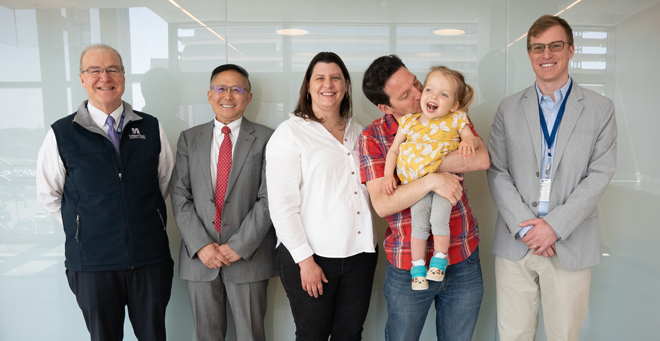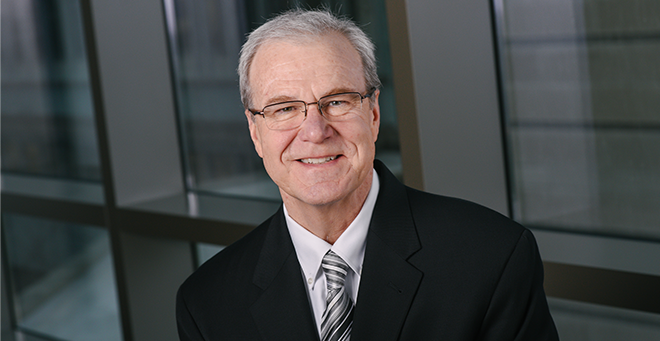As the year comes to a close, the Office of Communications is rerunning some of the biggest and most read stories posted in 2023, with topics such as a breakthrough in gene therapy treatment, journalist Katie Couric’s address to the Class of 2023 and the addition of a second regional campus. This story was originally published on July 18.

A Boston toddler who was one of the first to receive an investigational gene therapy for Canavan disease developed at UMass Chan Medical School delivered a very special “thank you” to the research team in a visit with her parents this spring.
Noa Greenwood, age 2½, played shyly with the scientist who lavished her with attention, babbled to her parents, sat up in her booster seat at a big conference table and fed herself snacks. It was a far cry from her development 10 months earlier, before she received the first dose of gene therapy BBP-812.
Her parents, Lee and Lori Greenwood, wanted the scientists behind the AAV9 vector gene therapy to see the impact their work has made.
“When I say medical miracle, it’s not just me being a proud parent,” said Lori. “It’s really hard for me to express it because it is so monumental.”
Canavan disease is a progressive, fatal, genetic disorder affecting the central nervous system, muscles and eyes. Early symptoms in infancy may include increased head size, weakness, low muscle tone and loss of head control. The condition is caused by mutations in the ASPA gene.
Research led by Guangping Gao, PhD, the Penelope Booth Rockwell Professor in Biomedical Research, professor of microbiology & physiological systems, director of the Horae Gene Therapy Center and director of the Li Weibo Institute for Rare Diseases Research; and Dominic J. Gessler, MD, PhD’20, assistant professor of neurological surgery, is the foundation of the CANaspire Phase I-II open-label clinical trial sponsored by Aspa Therapeutics, a BridgeBio company. Neurologist Florian Eichler, MD, is principal investigator of the trial being conducted at Mass General Hospital.
Noa was diagnosed with Canavan at 11 months. The Greenwoods said they were lucky to have access to Canavan expert Dr. Eichler as Noa’s neurologist and to have Noa be eligible for the CANaspire trial. In June 2022, at 22 months, she became the third child to receive a dose of the gene therapy.
New findings from the first six CANaspire participants were presented at the 26th Annual Meeting of the American Society of Gene and Cell Therapy in May.
In the conference room in the Horae Gene Therapy Center in April, Noa’s typical toddler behavior was promising progress.
“I can’t believe it. I’m shocked. Looking at her, she is not a 2-year-old patient with Canavan,” said Elisabet Mandon, PhD, associate professor of microbiology & physiological systems and part of the gene therapy research team.
“What Noa is doing is just what my grandchildren would do,” said Dr. Gao. “Canavan research is part of my life, and to see gene therapy make a difference, it’s just so satisfying.”
Meeting a child who received gene therapy also guides researchers. “In clinical practice, you identify problems or diseases, and the treatment options are limited. But bringing those questions back to the lab and trying to find answers, and then seeing a child who responds, feels like you can grab the answer. It’s bench to bedside, to bench,” said Dr. Gessler.
Noa’s future development remains unclear, as the gene therapy is in early investigational stages. Still, “It’s really nice to be a part of the answers,” said Lori. “They see her, they learned from her, they saw what happened with her and they’re able to adjust it for the kids going forward. It’s inspiring to be a part of the learning that’s happening.”
The bond between a patient’s family and the scientists working hard in labs at UMass Chan was inspiring to all in the meeting.
“You’re working for Noa,” Lee Greenwood said as he thanked everyone. “It’s not Baby 003; it’s Noa.”


